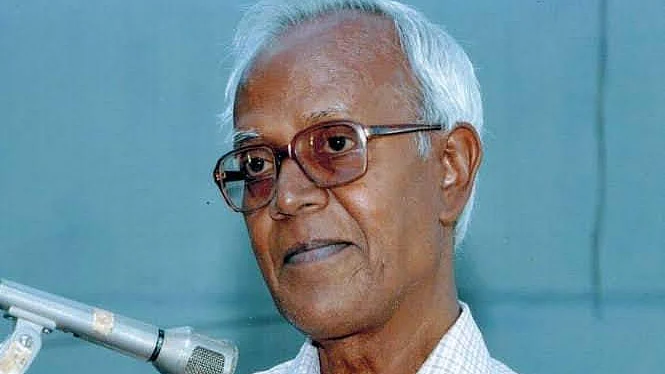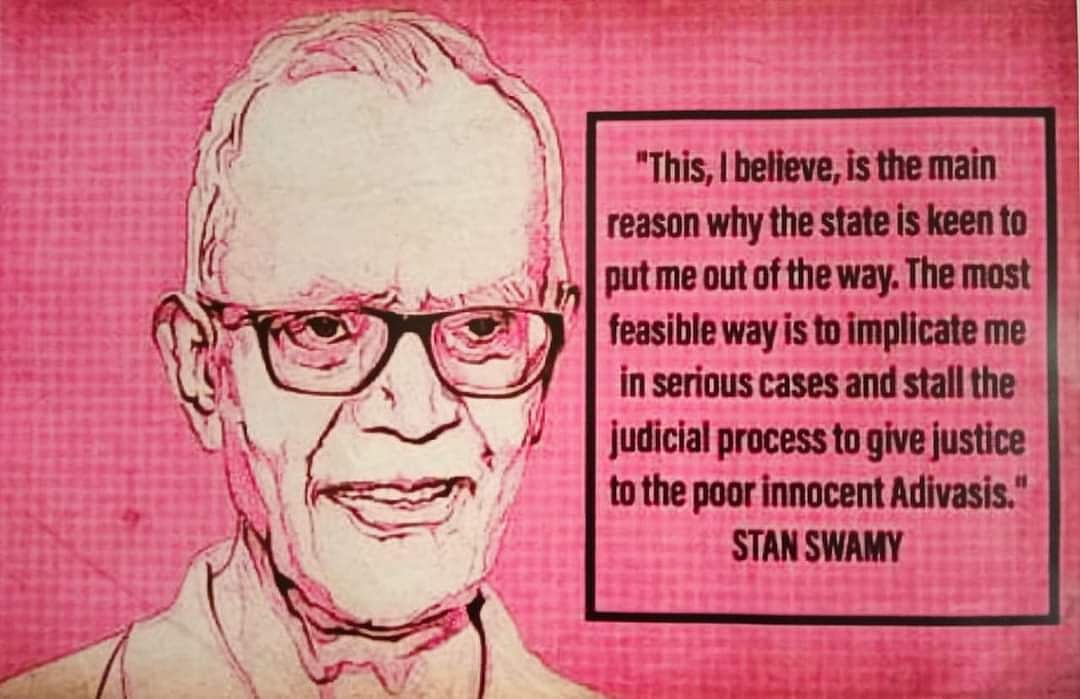Outpouring of grief in Jharkhand following the demise of Fr Stan Swamy
The Jesuit Priest from Trichy in Tamil Nadu, fond of listening to Ilaiyaraja and AR Rahman and with a Master’s degree in Sociology, is remembered fondly by the people among whom he spent over 50 years

A respected former newspaper editor today wrote from Kolkata, “I just want to share my sadness and my fury with you. I had met Fr Stan Swami in Ranchi. Such a gentle soul. So kind-hearted, so unassuming. A true bhadralok. I am feeling bereft at the way he was treated at the end of his generous life.” This was one of the several messages I received this afternoon from Jharkhand after the news of the demise of Fr Stan Swamy went viral.
A WhatsApp message from an activist in Jamshedpur attached a photograph of Fr Swamy and read:
“This photo of Father Stan is clamped in a X- Ray view box in my office, I saw him this morning as I do every day but I was not prepared for such terrible news of the demise of Father…Father of the toiling masses has been killed by the state implicating him on fake charges to deter him to act for Adivasis and to speak up for upholding human rights…”
“I remember my visit to Ranchi at the end of 2001 to hand him an article on Adivasis written by me with the request to publish in the magazine he edited. I got a phone call after six months from Johar office in Chaibasa and I was informed that my article had been published as recommended by Father Stan,…” the message went on to read.

That the Jharkhand chief minister Hemant Soren was forced to tweet his condolences indicates the sentiment in the state. The public outpouring of grief is expected when his body is returned to the people he served for over half a century.
Those who have never met Fr Stan Swamy, the 84-year-old priest who passed away earlier today, think of him as a gentle soul. What else can you be when you are in your eighties? But though he was frail, he was restless and fiery. His eyes would light up when he spoke of injustice, exploitation and his frustration with the administration. Not many in the administration or in Jharkhand Police took kindly to him because of his strident criticism of their conduct.
He was relentless in attending protests, taking part in processions, offering dharnas, writing letters and petitions, knocking on the judiciary for relief, writing to the NHRC for conducting inquiries and bringing out newsletters and periodicals to give voice to the voiceless. He was, I was told, a permanent fixture at seminars and workshops on tribal rights in Ranchi.
Local Hindi newspapers were less than kind to him. While Prabhat Khabar, the Hindi Daily newspaper once edited by Hari Vansh, now the Deputy Chairman of the Rajya Sabha and a JD(U) leader, dutifully published his statements and reported on activities, others grudgingly had to follow. If memory serves me right, he also wrote for the newspaper. But other newspapers were not so hospitable. Reports that he gave shelter to Maoists, that he believed in Revolution and was instigating ‘innocent’ tribals would appear often enough. Fr Stan, as he was affectionately called, did not help his cause with his fiery prose. They needed a good editor with considerable skill to tone them down and then face his wrath at having mutilated his writing.
He belonged to a long line of Jesuit priests in Jharkhand who took up the cause of tribals, educated them, nursed and healed them in sickness, provided them with legal aid every time they were framed in false cases. Their attempts to educate tribals about rights given to them by the Constitution were frowned upon by the mainstream. The priests were hounded, branded anti-national or as Liberation Theologists and were harassed for lending their support to the people. Any gathering of 50 tribals and outsiders would be looked at suspicion and reports appear that armed training was being imparted.
He was often criticized for being anti-development. He was certainly suspicious of big development projects which displaced tribals and robbed them of their land. More often than not, the developers, industry and the Government refused to even discuss the issues with him.
Fr Stan would have been used to it, one thought. But when local newspapers in Ranchi carried screaming headlines in 2018 saying, “ Father Stan Swamy accused in plot to assassinate Modi,” he was both hurt and outraged. He petulantly complained that his reputation had been tarnished.
Parambir Singh, the then Maharashtra ADGP, had told the media that Fr Swamy was engaged in funding Naxalite activities. He had cited as proof a letter allegedly written to one ‘Comrade Prakash’ by incarcerated Chhattisgarh lawyer Sudha Bharadwaj in which she claimed she had asked Fr Stan to arrange for funds but had received no assurance.
Both Bhardwaj and Fr Swamy had denied the allegation. And the priest had written to the NHRC demanding an inquiry into the harassment of human rights activists.
The Bhima Koregaon conspiracy case is almost certainly fabricated. But with both police and court documents in Marathi and the NIA less than transparent about the evidence, a proper defence is yet to be mounted. And people remain in the dark.
In his advanced years Fr Swamy, who had done his post-graduation in Sociology from Philippines and had returned to India in 1971, was almost exclusively engaged in writing. It remains a mystery why he was deemed to be a threat to the state and the Prime Minister.
One can only hope that by dying he would hasten a full inquiry into the Bhima Koregaon case, release of the activists and help unearth the laughable but sinister ‘conspiracy to assassinate the Prime Minister’.
Follow us on: Facebook, Twitter, Google News, Instagram
Join our official telegram channel (@nationalherald) and stay updated with the latest headlines
Published: 05 Jul 2021, 7:35 PM
